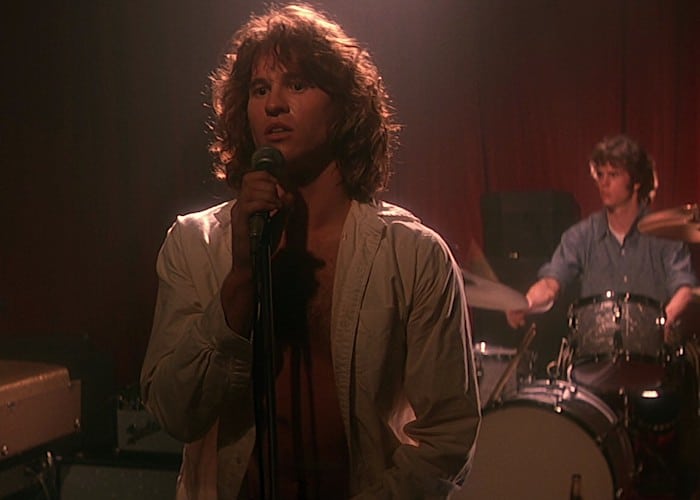
During the press tour for his 1998 memoir Light My Fire, The Doors keyboardist Ray Manzarek continued to criticize Oliver Stone for his highly inaccurate biopic on the band released six years earlier. At one reading and signing event that summer, I asked Manzarek from a crowd of fans why he doesn’t just make his own movie about The Doors if he’s that upset about Stone’s. He’d gone to film school, after all, and now he had a new book all set for adaptation. He replied that he was more interested in some other film ideas he had (one of which became Love Her Madly, his 2000 romantic thriller that gives Jim Morrison a story credit).
Manzarek’s version of The Doors could have been an interesting alternative take, one with a very personal perspective and focus on the truth. It also could have been boring in its straightforward attention to the facts. We’ll never know for sure about that unmade movie, but what we do know and have known for 25 years now is Stone’s film is first and foremost a piece of entertainment. One that uses creative license to depict an iconic rock group with an exaggeration of its already overblown mythology, as well as that of the whole late 1960s counterculture nostalgia of the time. The problem is that biopics like this are too often accepted as and are even demanded to be works of history.
Well, The Doors is still kind of a work of history, just not historical record. There are plenty ‐ and I do mean plenty ‐ of books and documentaries for that. But Manzarek was justifiably upset because the movie doesn’t always portray him (as played by Kyle MacLachlan) as a good friend to his buddy Jim (Val Kilmer). And a movie like this is seen by a whole lot more people than read his book. Patricia Kennealy was right to be mad, too, given that her name was attached to an amalgamation (Kathleen Quinlan) rather than a character strictly based on her. Shouldn’t Stone have just done a fully fictional movie inspired by The Doors, like Todd Haynes would later do with David Bowie for Velvet Goldmine? Unfortunately, most of Haynes’s genius approaches to biopics, which would include the multi-portrayal of Bob Dylan in I’m Not There, didn’t exist yet.
Back in 1991, The Doors was the closest I’d seen to a pop music biopic that didn’t really care about being entirely authentic, and if you were familiar with the real stuff you’d accept it for that, or should. Many biographical films had gotten things wrong in the past, and a few received complaints from their real-life subjects regarding their portrayals, but those tended to be features intent on being plainly and sincerely about a life story. The Doors is more of a folk tale of a poetic legend, a rock god, and it’s also about an era. Plus a romance initially inspired by Morrison’s lyrics more than what really happened between him and Pamela Courson (Meg Ryan). It’s pretty much a music video jukebox musical mistaken for a conventional biopic.
That doesn’t make it not a biopic. And in its defense, it doesn’t play too loose with hard facts that truly matter. It’s not like a movie depicting “Albert Einstein” as a Tasmanian who invented rock and roll and carbonated beer. Or one with Marie Antoinette wearing Converse All-Stars. But it is confused for more of a biographical work than it is because of how audiences get sucked into movies about famous people and expect them to be as reliable as an encyclopedia article. Or, now, at least a Wikipedia article. People even think Kilmer looks just like Morrison, which is absurd if you view them side by side. These people probably just have seen enough images of Kilmer as Morrison that he’s taken over in their mind. It happens a lot with the genre, unfortunately, and thanks to last year’s Steve Jobs we should finally appreciate that biopics are better served by casting not meant for a lookalike impersonation.
Also consider the confusion with the movie’s on-screen soundtrack and its soundtrack album (which, it should be frankly noted, was probably the main reason for the biopic to exist in the first place since it resulted in an extra platinum-selling “best of” compilation). In The Doors, Kilmer’s voice is heard performing Morrison’s lyrics. But that’s not what you get from the album, and that’s good because it distinguishes the movie as artifice and separates that from anything external that can be so misleading as a replica audio recording (the publicity images and posters of Kilmer as a replica Morrison don’t count because it’s clearly not really Morrison). That’s the way everything in this and any biopic should be seen as: a fabrication.
We still get plenty of conventional and straightforward biopics, music or otherwise. And some, such as Ray and Walk the Line are decent ‐ although the latter does make the mistake in having a soundtrack album of songs performed by the actors. Also, there’s last year’s Straight Outta Compton, which at times seems to evoke The Doors enough for me to think it might be more cleverly constructed than it appears. But we also see a lot more creative, unconventional biographical movies, including those by Haynes and written by Aaron Sorkin or Charlie Kaufman, to a degree that we generally don’t or ought not to be criticizing looseness of truth with each “true story” to hit theaters. Stone’s film led the pack for me, and I think perhaps it could be better received today than when it came out. It’s just too bad that Manzarek isn’t still around to be convinced that The Doors is a good biopic as far as what that actually means.
